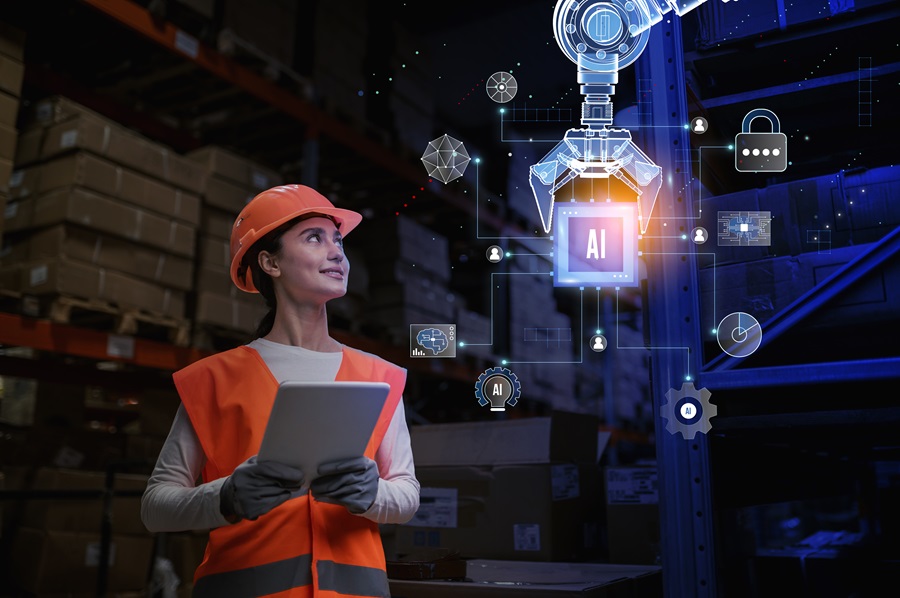Table of Contents
Toggle
Artificial Intelligence (AI) is progressing rapidly, with many experts noting it is no longer just the future—it is happening now. From large multinational corporations to recent graduates, there is growing excitement about what AI can offer, whether it brings genuine benefits, and what the technology might mean for everyone. Opinions on AI vary, sparking a key question: is AI an “Aladdin’s lamp” or a “Pandora’s box”? Many IT professionals believe AI can open up new opportunities but also introduce challenges. AI is already impacting various industries, enabling them to achieve goals faster, with greater accuracy, and at lower costs.
Growth and Competition in the Supply Chain Industry
The global supply chain industry is forecasted to grow at a Compound Annual Growth Rate (CAGR) of 9.4%, from $28.9 billion in 2022 to $45.2 billion by 2027 Markets and Markets. Unlike previous years, when companies primarily competed on product alone, supply chain networks today compete with each other on efficiency, innovation, and customer satisfaction. Success hinges on the development, design, production, distribution, and coordination of supply chain activities to ensure products reach the right customers at the right time, location, and price. Here’s how AI can impact key areas in supply chain management:
Demand Forecasting
AI significantly improves the accuracy and speed of demand forecasting. By analyzing vast data sets, AI can detect trends and patterns, helping predict market changes globally. Adaptive learning models enable systems to learn from historical data and adapt to shifting trends, improving forecasting accuracy over time. Additionally, AI can identify complex patterns, incorporate contextual factors, and quickly adjust to unexpected changes, all of which contribute to more precise forecasting.
Inventory Management
Inventory management is another critical area where AI can enhance efficiency, productivity, and accuracy. AI aids demand forecasting, automates ordering and reordering, and assists in stock-taking, classification, and supplier performance evaluation. By simplifying activities like receiving, counting, and monitoring stock across the supply chain, AI can ensure timely delivery to customers, supporting an organization’s competitive strategy.
Warehouse Management
Warehouses, despite being spaces where inventory remains stationary, are hubs of intense activity. Tasks such as sorting, classifying, and shipping products all impact last-mile delivery. AI plays a role in inbound and outbound activities, including storage, picking, packing, and labeling. E-commerce companies, in particular, benefit from AI automation in warehouse operations. The technology assists with space planning, automating stock movement, scheduling Automated Guided Vehicles (AGVs), and improving safety protocols, making warehouse operations smoother and more productive.
Enhancing Human Productivity and Safety
AI is not just transforming machine operations; it also enhances human productivity, speed, and accuracy. AI tools improve the workplace experience by increasing both productivity and safety. Through predictive analytics and machine learning, AI enables occupational safety by monitoring workplace conditions, analyzing safety data, and recognizing worker behaviors for timely intervention.
Generative AI: The Next Frontier
Generative AI (GenAI), an emerging technology, is gaining traction as it can generate new data content in various forms—text, images, videos, and audio. Approximately 40% of firms in the supply chain industry are already investing in GenAI to manage and utilize knowledge more effectively (Source: EY Insight).
The Future of AI and Responsibility in Adoption
AI and GenAI are here to stay, with growing importance over the coming years. These tools are only as powerful as the data and algorithms they utilize. Effective AI deployment requires well-trained personnel who can operate these tools responsibly, benefiting not just their organizations but society as a whole. AI tools provide the potential to accelerate success across industries, but realizing that success responsibly depends on well-defined goals. Adopting these tools will create opportunities for companies and consumers alike, making for a more intense, competitive, and intriguing marketplace.

